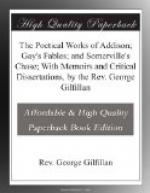An age that yet uncultivate and rude,
Where’er the poet’s fancy led, pursued
20
Through pathless fields, and unfrequented floods,
To dens of dragons and enchanted woods.
But now the mystic tale, that pleased of yore,
Can charm an understanding age no more;
The long-spun allegories fulsome grow,
While the dull moral lies too plain below.
We view well-pleased at distance all the sights
Of arms and palfreys, battles, fields, and fights,
And damsels in distress, and courteous knights;
But when we look too near, the shades decay,
30
And all the pleasing landscape fades away.
Great Cowley then (a mighty genius) wrote,
O’errun with wit, and lavish of his thought:
His turns too closely on the reader press;
He more had pleased us, had he pleased us less.
One glittering thought no sooner strikes our eyes
With silent wonder, but new wonders rise.
As in the milky-way a shining white
O’erflows the heavens with one continued light;
That not a single star can show his rays,
40
Whilst jointly all promote the common blaze.
Pardon, great poet, that I dare to name
The unnumbered beauties of thy verse with blame;
Thy fault is only wit in its excess,
But wit like thine in any shape will please.
What Muse but thine can equal hints inspire,
And fit the deep-mouthed Pindar to thy lyre;
Pindar, whom others, in a laboured strain
And forced expression, imitate in vain?
Well-pleased in thee he soars with new delight,
50
And plays in more unbounded verse, and takes a nobler flight.
Blest man! whose spotless life and charming lays
Employed the tuneful prelate in thy praise:
Blest man! who now shalt be for ever known
In Sprat’s successful labours and thy own.
But Milton next, with high and haughty stalks,
Unfettered in majestic numbers walks;
No vulgar hero can his Muse engage;
Nor earth’s wide scene confine his hallowed rage.
See! see! he upward springs, and towering high,
60
Spurns the dull province of mortality,
Shakes heaven’s eternal throne with dire alarms,
And sets the Almighty thunderer in arms.
Whate’er his pen describes I more than see,
Whilst every verse arrayed in majesty,
Bold, and sublime, my whole attention draws,
And seems above the critic’s nicer laws.
How are you struck with terror and delight,
When angel with archangel copes in fight!
When great Messiah’s outspread banner shines,
70
How does the chariot rattle in his lines!
What sounds of brazen wheels, what thunder, scare,
And stun the reader with the din of war!
With fear my spirits and my blood retire,
To see the seraphs sunk in clouds of fire;
But when, with eager steps, from hence I rise,
And view the first gay scenes of Paradise,
Where’er the poet’s fancy led, pursued
20
Through pathless fields, and unfrequented floods,
To dens of dragons and enchanted woods.
But now the mystic tale, that pleased of yore,
Can charm an understanding age no more;
The long-spun allegories fulsome grow,
While the dull moral lies too plain below.
We view well-pleased at distance all the sights
Of arms and palfreys, battles, fields, and fights,
And damsels in distress, and courteous knights;
But when we look too near, the shades decay,
30
And all the pleasing landscape fades away.
Great Cowley then (a mighty genius) wrote,
O’errun with wit, and lavish of his thought:
His turns too closely on the reader press;
He more had pleased us, had he pleased us less.
One glittering thought no sooner strikes our eyes
With silent wonder, but new wonders rise.
As in the milky-way a shining white
O’erflows the heavens with one continued light;
That not a single star can show his rays,
40
Whilst jointly all promote the common blaze.
Pardon, great poet, that I dare to name
The unnumbered beauties of thy verse with blame;
Thy fault is only wit in its excess,
But wit like thine in any shape will please.
What Muse but thine can equal hints inspire,
And fit the deep-mouthed Pindar to thy lyre;
Pindar, whom others, in a laboured strain
And forced expression, imitate in vain?
Well-pleased in thee he soars with new delight,
50
And plays in more unbounded verse, and takes a nobler flight.
Blest man! whose spotless life and charming lays
Employed the tuneful prelate in thy praise:
Blest man! who now shalt be for ever known
In Sprat’s successful labours and thy own.
But Milton next, with high and haughty stalks,
Unfettered in majestic numbers walks;
No vulgar hero can his Muse engage;
Nor earth’s wide scene confine his hallowed rage.
See! see! he upward springs, and towering high,
60
Spurns the dull province of mortality,
Shakes heaven’s eternal throne with dire alarms,
And sets the Almighty thunderer in arms.
Whate’er his pen describes I more than see,
Whilst every verse arrayed in majesty,
Bold, and sublime, my whole attention draws,
And seems above the critic’s nicer laws.
How are you struck with terror and delight,
When angel with archangel copes in fight!
When great Messiah’s outspread banner shines,
70
How does the chariot rattle in his lines!
What sounds of brazen wheels, what thunder, scare,
And stun the reader with the din of war!
With fear my spirits and my blood retire,
To see the seraphs sunk in clouds of fire;
But when, with eager steps, from hence I rise,
And view the first gay scenes of Paradise,




